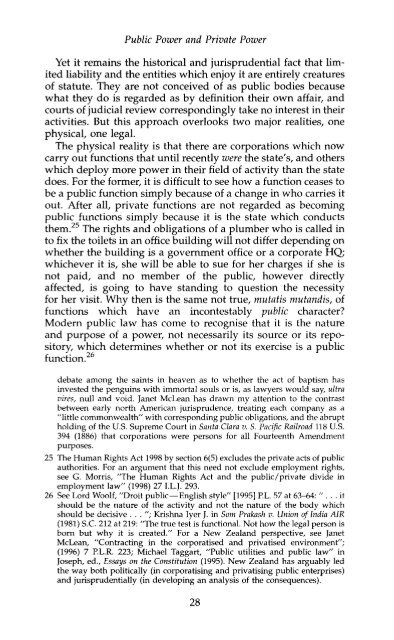LECTURES - College of Social Sciences and International Studies ...
LECTURES - College of Social Sciences and International Studies ...
LECTURES - College of Social Sciences and International Studies ...
You also want an ePaper? Increase the reach of your titles
YUMPU automatically turns print PDFs into web optimized ePapers that Google loves.
Public Power <strong>and</strong> Private Power<br />
Yet it remains the historical <strong>and</strong> jurisprudential fact that limited<br />
liability <strong>and</strong> the entities which enjoy it are entirely creatures<br />
<strong>of</strong> statute. They are not conceived <strong>of</strong> as public bodies because<br />
what they do is regarded as by definition their own affair, <strong>and</strong><br />
courts <strong>of</strong> judicial review correspondingly take no interest in their<br />
activities. But this approach overlooks two major realities, one<br />
physical, one legal.<br />
The physical reality is that there are corporations which now<br />
carry out functions that until recently were the state's, <strong>and</strong> others<br />
which deploy more power in their field <strong>of</strong> activity than the state<br />
does. For the former, it is difficult to see how a function ceases to<br />
be a public function simply because <strong>of</strong> a change in who carries it<br />
out. After all, private functions are not regarded as becoming<br />
public functions simply because it is the state which conducts<br />
them. 25 The rights <strong>and</strong> obligations <strong>of</strong> a plumber who is called in<br />
to fix the toilets in an <strong>of</strong>fice building will not differ depending on<br />
whether the building is a government <strong>of</strong>fice or a corporate HQ;<br />
whichever it is, she will be able to sue for her charges if she is<br />
not paid, <strong>and</strong> no member <strong>of</strong> the public, however directly<br />
affected, is going to have st<strong>and</strong>ing to question the necessity<br />
for her visit. Why then is the same not true, mutatis mut<strong>and</strong>is, <strong>of</strong><br />
functions which have an incontestably public character?<br />
Modern public law has come to recognise that it is the nature<br />
<strong>and</strong> purpose <strong>of</strong> a power, not necessarily its source or its repository,<br />
which determines whether or not its exercise is a public<br />
function. 26<br />
debate among the saints in heaven as to whether the act <strong>of</strong> baptism has<br />
invested the penguins with immortal souls or is, as lawyers would say, ultra<br />
vires, null <strong>and</strong> void. Janet McLean has drawn my attention to the contrast<br />
between early north American jurisprudence, treating each company as a<br />
"little commonwealth" with corresponding public obligations, <strong>and</strong> the abrupt<br />
holding <strong>of</strong> the U.S. Supreme Court in Santa Clara v. S. Pacific Railroad 118 U.S.<br />
394 (1886) that corporations were persons for all Fourteenth Amendment<br />
purposes.<br />
25 The Human Rights Act 1998 by section 6(5) excludes the private acts <strong>of</strong> public<br />
authorities. For an argument that this need not exclude employment rights,<br />
see G. Morris, "The Human Rights Act <strong>and</strong> the public /private divide in<br />
employment law" (1998) 27 I.L.J. 293.<br />
26 See Lord Woolf, "Droit public—English style" [1995] P.L. 57 at 63-64: "... it<br />
should be the nature <strong>of</strong> the activity <strong>and</strong> not the nature <strong>of</strong> the body which<br />
should be decisive . . . "; Krishna Iyer J. in Som Prakash v. Union <strong>of</strong> India AIR<br />
(1981) S.C. 212 at 219: "The true test is functional. Not how the legal person is<br />
born but why it is created." For a New Zeal<strong>and</strong> perspective, see Janet<br />
McLean, "Contracting in the corporatised <strong>and</strong> privatised environment";<br />
(1996) 7 P.L.R. 223; Michael Taggart, "Public utilities <strong>and</strong> public law" in<br />
Joseph, ed., Essays on the Constitution (1995). New Zeal<strong>and</strong> has arguably led<br />
the way both politically (in corporatising <strong>and</strong> privatising public enterprises)<br />
<strong>and</strong> jurisprudentially (in developing an analysis <strong>of</strong> the consequences).<br />
28

















